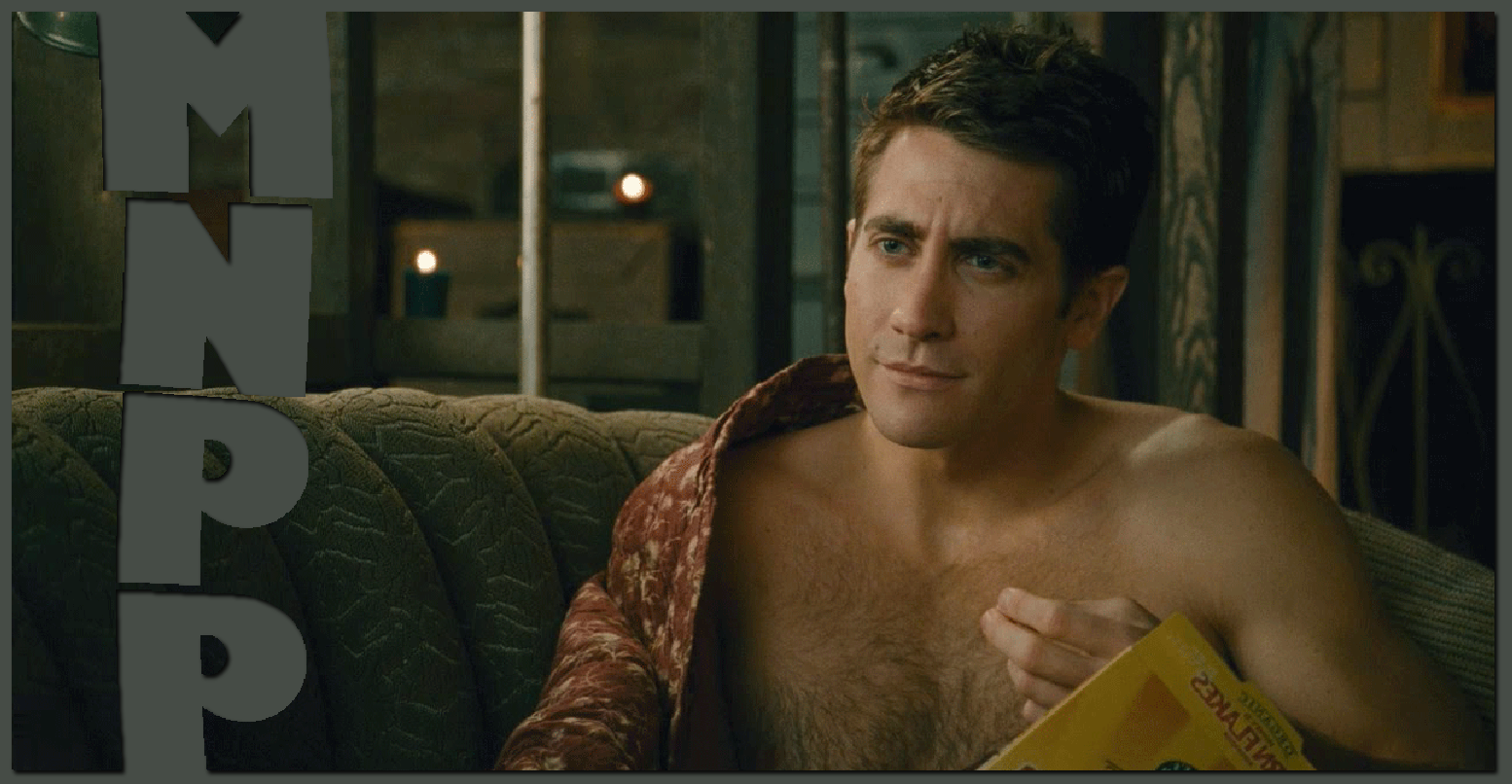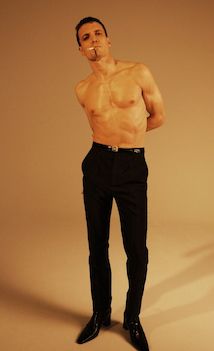I've been meaning to say something about the movies I've watched lately, but haven't had it in me this week - if you couldn't tell by the slight posting - to do anything terribly detailed. So I'm just going to try and wrench my scattered thoughts out of my system and move on and stop feeling guilty. You'd think I was raised a Catholic or something.
 Zodiac (directed by David Fincher) --- That phrase - directed by David Fincher - has been the major focus of most of the reviews I've read of Zodiac, and I've found myself wondering, after watching the movie, if it were truly possible to divorce all the connotations that that phrase holds from one's opinion on the film, just what one would make of it. Because what you have are the inevitable comparisons to Seven and just how very different the films are, and how everyone (yes, myself included) is suprised to see Fincher had this sort of movie inside him, without all the usual bells and whistles and astonishing camera feats so associated with his name.
Zodiac (directed by David Fincher) --- That phrase - directed by David Fincher - has been the major focus of most of the reviews I've read of Zodiac, and I've found myself wondering, after watching the movie, if it were truly possible to divorce all the connotations that that phrase holds from one's opinion on the film, just what one would make of it. Because what you have are the inevitable comparisons to Seven and just how very different the films are, and how everyone (yes, myself included) is suprised to see Fincher had this sort of movie inside him, without all the usual bells and whistles and astonishing camera feats so associated with his name.What of Zodiac, the movie, by itself? And that, my friends, is something I don't think I'm capable of seeing, at least not with only a single viewing. My eyes swooped here and there for signature Fincherian (is it too early for that phrase?) touches - the floating camera following the taxi cab from some terribly omniscient angle that became more and more claustrophobic as it dialed down closer and
 closer; the gorgeously rendered saturated tones - here browns and blacks - that only Michael Mann before him has gotten to look so goddamned pretty with digital film; the caress of Fincher's camera across the Zodiac killer's cryptic poetry. These are, even in a film so divorced from Fincher's usual techniques, the sort of stylistic flourishes that lets one know - this is a David Fincher movie!
closer; the gorgeously rendered saturated tones - here browns and blacks - that only Michael Mann before him has gotten to look so goddamned pretty with digital film; the caress of Fincher's camera across the Zodiac killer's cryptic poetry. These are, even in a film so divorced from Fincher's usual techniques, the sort of stylistic flourishes that lets one know - this is a David Fincher movie!See? Fincher Fincher Fincher. When each of those touches I just listed are so muted and sporadic here that if it were another director they wouldn't especially bear mention. But what, just six movies into his career, and David Fincher has become this... property, which I guess is what he wanted to break out of here, with a film that's more about a slowly enveloping sadness than pyrotechnics and plot twists. And I do think he succeeded wonderfully. Zodiac, a nearly three-hour film, felt fully realized and ambitious and real, and as it spiralled down into obsession with each character becoming tainted by their association with the case, we too, the
 audience, find ourselves caught up in this seemingly indecipherable web of information that is slowly leaking away with time. Here and there bits bob to the surface, and we and the characters think we may have figured something out, only to have the sheer immensity of detail leave the entire thing ultimately unknowable.
audience, find ourselves caught up in this seemingly indecipherable web of information that is slowly leaking away with time. Here and there bits bob to the surface, and we and the characters think we may have figured something out, only to have the sheer immensity of detail leave the entire thing ultimately unknowable.Much has been said on the lack of a resolution to the film - that, like in real life, at least as of this date in history, the case remains unsolved - but I have to say that the moment between Jake Gyllenhaal's Robert Graysmith and John Lynch's Arthur Leigh Allen in the hardware store was one of the most satisfying (yet - at the same time!!! - infuriatingly oblique) "resolutions" I've seen a movie have up its sleeve in ages. The dialogue that passes between these two character's eyes did more than any beefed-up finale ever could've.
 Black Snake Moan (directed by Craig Brewer) --- Christina Ricci was, as always, making the most out of what she's handed. Unfortunately, here she was handed - or actually, I do believe, this was a role she pretty much begged for - a thankless role in a pointless mess of a movie.
Black Snake Moan (directed by Craig Brewer) --- Christina Ricci was, as always, making the most out of what she's handed. Unfortunately, here she was handed - or actually, I do believe, this was a role she pretty much begged for - a thankless role in a pointless mess of a movie.I was excited about this movie beforehand - I guess I thought that Brewer maybe had something to say? I'd liked Hustle & Flow for the most part, though I did think the film thought it redeemed the DJay character for his misogyny when it did anything but, which in retrospect should've been a big bellowing warning bell for Black Snake Moan, where Brewer was supposed to be, or at least in the theory I'd ascribed to this film beforehand I figured hey, this'd be the place to tackle, ya know, race and gender roles, what with the big black man chaining the little white woman up to his radiator cuz she's all sexed-up and he's all religious and all.
 But no, Brewer seems content to just throw all of these things at the screen and then... not very much else, really. Am I supposed to understand why Sam Jackson's Lazarus decides this is the route to go? The movie seems to think it makes it a comprehensive move on his part. The movie seems to think that it's taking these characters from old exploitation movies and making them human, ascribing some kind of reason and logic to actions that in old exploitation flicks were just done to, ya know, put a chick in chains.
But no, Brewer seems content to just throw all of these things at the screen and then... not very much else, really. Am I supposed to understand why Sam Jackson's Lazarus decides this is the route to go? The movie seems to think it makes it a comprehensive move on his part. The movie seems to think that it's taking these characters from old exploitation movies and making them human, ascribing some kind of reason and logic to actions that in old exploitation flicks were just done to, ya know, put a chick in chains.But seriously, I prefer the honesty of a movie that doesn't pretend to be about what's going on inside that chained-up gal's heart while spending two hours with the camera attached to her inner thighs. If you wanna show me some tits, then don't try and paint them up with some sort of faux-social commentary with characters that you haven't fleshed out beyond "My wife left me for my brother, I am sad and angry" and "I got da fevah!" and then have the nerve to act as if your teaching me a lesson when Love Reigns In The End. Gah.
 Running With Scissors (directed by Ryan Murphy) --- I haven't read the book by Augusten Burroughs, but can someone tell me - does it come with some sort of computer chip embedded in the spine so that every time you turn a page another "nostalgia-inducing" tune come blasting out at you, underlining every. single. point? It just got to the point where Murphy was so distracting away from some very good performances - Jill Clayburgh! - that I wished I could reach in the TV screen and around the back of the camera and pull him out through the screen and shake him until he went deaf. Because I think only then would he realize that he's not directing an ad for the movie's soundtrack.
Running With Scissors (directed by Ryan Murphy) --- I haven't read the book by Augusten Burroughs, but can someone tell me - does it come with some sort of computer chip embedded in the spine so that every time you turn a page another "nostalgia-inducing" tune come blasting out at you, underlining every. single. point? It just got to the point where Murphy was so distracting away from some very good performances - Jill Clayburgh! - that I wished I could reach in the TV screen and around the back of the camera and pull him out through the screen and shake him until he went deaf. Because I think only then would he realize that he's not directing an ad for the movie's soundtrack..




































2 comments:
I"m definitely with you on Black Snake Maon ... I thoroughly enjoyed Brewer's Hustle & Flow, but I have no idea what he thought he was doing with this monstrosity .. Samuel L. Jackson soldiered through as usual, but he deserves much, much better
It was beyond boring and predictable, as usable, when a writer runs out of ideas to keep the movie running for 2 hours lets have lots of scenes of a half naked woman who only has underwear on throughout the entire movie and flashes her tits often is only to keep you hopeful that the scene repeats itself over and over.
Post a Comment